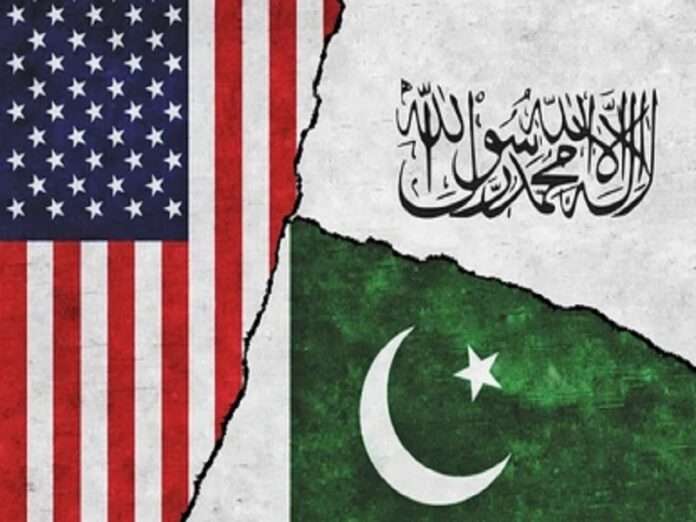Russian Foreign Minister Sergey Lavrov told Putin during their Security Council meeting on the same day as Trump’s inauguration and while reviewing regional conflicts that “Let us not forget Afghanistan, where the Americans are also trying to restore their presence to some extent, using neighbouring countries for this and thinking about returning their military infrastructure there. I am saying all this in terms of the policies carried out by the previous administration.” His accusation is worthy of further analysis.
The US’ most realistic access point to Afghanistan is Pakistan, which had passively assisted its two-decade-long military occupation of that neighboring country but at the same time also clandestinely backed the Taliban against foreign forces and the Afghan National Army alike. April 2022’s post-modern coup against former multipolar Prime Minister Imran Khan was meant to improve ties with the US and facilitate what Russia just accused it of but was deprioritized due to the ongoing proxy war in Ukraine.
Even so, the US still attempted to cultivate influence in the broader region, including in Central Asia. This never amounted to anything significant due to the moderating effect that Russia and China had on the potential plans that some in those countries might have been cooking. Their policymakers ultimately realized that it’s better not to provoke either of them through enhanced security partnerships with the US than to go through with the aforesaid at the possible expense of regional stability and bilateral trade.
Pakistan went a different way than they did, however, since its post-coup regime continued holding out hope of restoring their traditional role in aiding US military operations in Afghanistan in exchange for personal (including financial) benefits. This explains why it kept kowtowing to the US on everything apart from symbolically voting against Russia at the UNGA, which it was allowed by the US to do in order to keep open the possibility of having Russia modernize Pakistan’s resource industry instead of China.
Readers can learn more about this rationale here, which covers the Machiavellian ways in which the US is attempting to adapt to the emerging Multipolar World Order, but Pakistani-US ties have recently become troubled as was shortly thereafter explained here. In brief, Pakistan’s long-range ballistic missile program made the US suspect that it has illegal proliferation motives or possibly even hostile ones, while its brutal crackdown on the opposition goes far beyond what the US approved.
These greatly reduced its attractiveness to the US as an entry point to Afghanistan since policymakers apparently thought that Pakistan would leverage its logistical assistance to the American military there to continue with those two courses of action that recently prompted the US’ concern. In that event, the first might eventually lead to security risks while the second could risk further instability that might result in a national crisis which turns Pakistan into more of an American liability than a regional asset.
Having explained the larger context within which Lavrov made his latest remarks about Afghanistan, which hint at Russia’s suspicions that Pakistan wants to facilitate the return of US military infrastructure there, it’s now time to discuss what this could mean for their impressively close bilateral relations. As proven by Russia continuing to sell energy to the EU despite the bloc arming Ukraine, there’s no precedent to speculate that it’ll curtail or possibly cancel cooperation with much friendlier Pakistan.
In this particular case, Pakistan could passively assist the US in fostering Afghan-emanating security challenges (primarily unconventional/terrorist ones) along its southern “strategic borders” in Central Asia, but this is nowhere near as threatening as what the EU is currently doing in Ukraine. It’s also unclear whether Trump would be interested in turning a blind eye to the US’ two new concerns with Pakistan in order to return US military infrastructure to Afghanistan with all the risks that it entails.
Getting bogged down in Afghanistan once again isn’t something that he’s interested in, let alone in putting US troops’ lives on the line in the same conflict zone where Biden disastrously withdrew from and which provoked harsh criticism from Trump at the time, so nothing might come of this. Moreover, his administration is considered to be very Indophilic and might accordingly push back against any move in that direction since it could worsen ties with India, which is now the US’ top regional partner.
For these reasons, Lavrov’s latest remarks about Afghanistan and their innuendo about Pakistan conspiring to return US military infrastructure there should be seen only as a signal that Russia is aware of this plot, not as anything deeper. While some Russian policymakers might be disappointed that Pakistan is even considering this, others might be motivated to redouble Russia’s rapprochement with Pakistan in the hopes that it’ll be dissuaded or to capitalize on its potentially worsening ties with the US.







